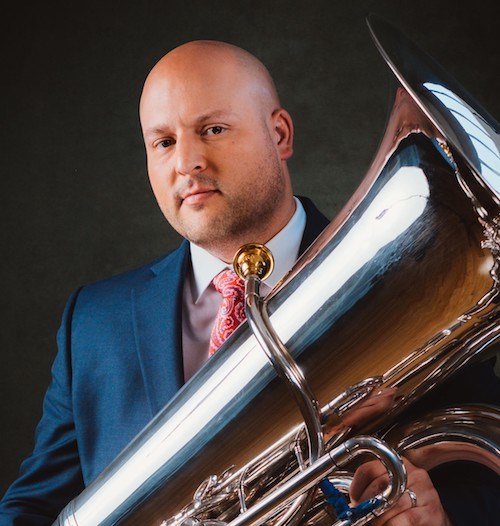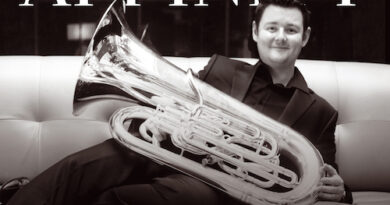My Practice Sessions: Aaron Tindall
Aaron Tindall is the Associate Professor of Tuba/Euphonium at the Frost School of Music at the University of Miami and the Principal Tuba of the Sarasota Orchestra.
What time do you begin your first practice session?
5 am-8 am
What is your daily warm-up routine?
“Warming-up” is getting my body/mind ready to go for the day and having the ability to do what I need to do on the instrument in an efficient/or short amount of time (I liken the first 20 mins of my routine to be a “warm-up”), and my routine(s) are designed to challenge my skill set helping to keep the things that I need to be able to do on the instrument at the highest level possible.
The first 20 mins of my day often look and start the same. I want to feel confident that if I’m in a bind, I can always find 10-20 mins to get my face going before a concert/solo recital…so I usually begin every day with some abbreviated long tones, slow flexibilities in the low, mid, and high registers, simple articulations, crescendo/decrescendo control exercises, and a few quick range/endurance sets. I then spend the rest of my time each morning (1 hour or so) rotating through routines that I have learned from the material of Joe Alessi, Chris Olka, Roger Bobo, and Alan Baer’s cross-training scales.
How long has this warm-up been a part of your practice sessions?
I’ve always been a huge warm-up proponent, but I’d say I’ve only really unlocked my own code and found what works the best for me/my chops in the last 5 years.
How long is your warm-up routine?
The initial warm-up is 20 minutes, and the rest of my routine is about 1 hr 10 mins.
What part of your warm-up do you look forward to the most?
I like to get moving in the routine, so I’d say the dynamic control exercises/range exercises are what I look forward to getting to. I also make sure to work in some Bach, Snedecor’s low register studies, Kopprasch, and Bordogni at the end of each session.
What time of day do you generally practice?
I try to get a big session done in the morning before my family is awake/orchestra rehearsal/or a long day of teaching at the “U”. I’ll try for one in the early afternoon, and then late at night before bed if the schedule allows.
How many practice sessions do you typically have a day?
2 to 3, but it depends on my teaching/concert/family schedule throughout the week.
Do you have a strict time limit for each practice session?
1 hr to 1 1/2 hrs.
How does your partner’s and/or family’s schedule fit into your practice sessions?
I’m still trying to figure this out! Some days are easier/tougher than others. Family first!
After your last practice session of the day, do you do anything the night before to prepare for the next day’s sessions?
I always make note of what needs to be addressed the following day in my routine, and what I need to spend time on musically enhancing.
What apps or products do you use to aid in your practice sessions?
Tonal Energy & Groove Bank
If you fail to not get in a solid warm-up, do you do anything different for the rest of your practice sessions?
No, just roll with it. Your performance career/life can’t always be dictated by how you got to warm-up that day, or how your chops feel at a certain moment. That is negligible to the listener…they don’t care one bit about your chops. They paid to hear a highly musical, great, energetic, and effortless performance.
When you are on tour or traveling, how are you able to adapt your practicing to fit in with the given circumstances?
Try to find the time to get that 20 mins in, and the rest of a routine if I’m lucky. Secure a room or space to play in…this is the hardest challenge to traveling on the road as a tuba player.
Is there anything else you would like to add that would be beneficial to other musicians?
Listen to a TON of music. Immerse yourself in as many musical genres as possible. Don’t be afraid to record yourself, and often! The best players out there are the ones who are aware of what they are good at doing and spend time focusing on and enhancing these abilities. They are also intrinsically aware of what they are still not good at and focus on finding ways to teach themselves through each struggle. Become your own teacher!



